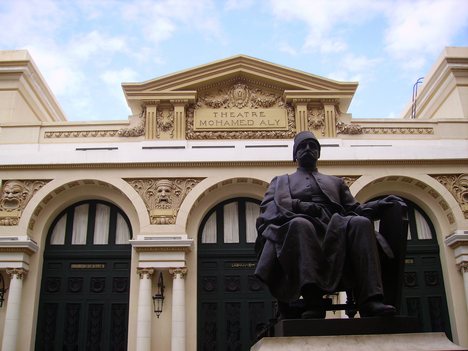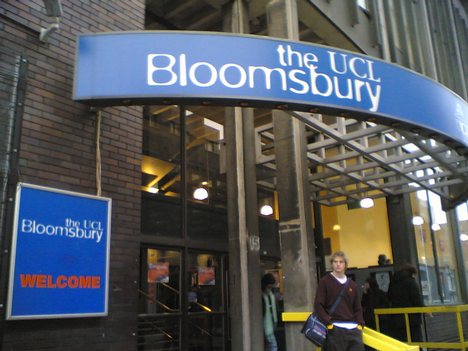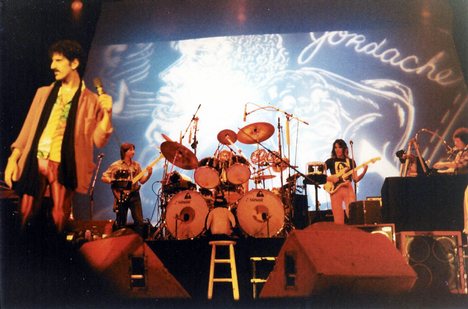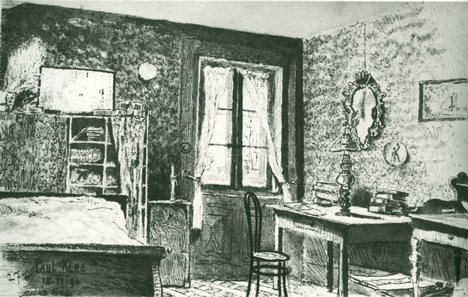
- Order:
- Duration: 0:43
- Published: 03 Dec 2007
- Uploaded: 27 Aug 2010
- Author: elliebobellie




















































![Barbican Centre is the largest performing arts centre in Europe.[1] Located in the north of the City of London, England, in the heart of the Barbican Estate, the Centre hosts classical and contemporary music concerts, theatre performances, film screenings and art exhibitions. It also houses a library, three restaurants, and a conservatory. The London Symphony Orchestra and the BBC Symphony Orchestra are based in the Barbican Centre's concert hall. The Barbican Centre is owned, funded, and manage Barbican Centre is the largest performing arts centre in Europe.[1] Located in the north of the City of London, England, in the heart of the Barbican Estate, the Centre hosts classical and contemporary music concerts, theatre performances, film screenings and art exhibitions. It also houses a library, three restaurants, and a conservatory. The London Symphony Orchestra and the BBC Symphony Orchestra are based in the Barbican Centre's concert hall. The Barbican Centre is owned, funded, and manage](http://web.archive.org./web/20110625101801im_/http://cdn.wn.com/pd/4a/91/ba89c8567770cec5b6df18f67f6f_grande.jpg)








Music parts for pit orchestra woodwind players in musical theatre are normally divided into "Reed Books". Orchestration varies with each show based on the type of music that will be performed, such as jazz, classical, or blues. For example, a Reed 1 Book may contain music for Piccolo, Flute, Eb Alto Saxophone, Bb Clarinet, and/or Oboe. A musician handed a Reed Book would be expected to play each part. Because the musician plays so many different instruments, he or she is referred to as a "doubler" (even though the Reed Books may have up to five instruments each).
This text is licensed under the Creative Commons CC-BY-SA License. This text was originally published on Wikipedia and was developed by the Wikipedia community.
Paulsen began working for WDVE, a Pittsburgh classic rock station, in the 1980s. He became a "morning staple" in the Pittsburgh region on WDVE Morning Show, which he co-hosted with Jim Krenn. Paulsen left the Morning Show and went on hiatus from WDVE for 11 months in 1999. Paulsen left for WRKZ in December 2006 and took over the afternoon drive time slot. In keeping with the station's talk format, his new show focused more on guests, interviews, and phone calls than music. Paulsen left WKRZ when it changed to a Top 40 format and began a sports talk show with Eddy Crow and Mike Logan on ESPN 1250.
Paulsen writes a regular column for the Washington, Pennsylvania-based Observer-Reporter. He has also published numerous books including Cow Tipping and Night Fruit Army. In the 1990s, he and Jim Krenn provided voice talents for Nickelodeon's Kablam! NFL Films used an interview with Paulsen in 2006's Steelers program.
On Monday September 27, 2010 Scott along with Mike Logan, Stan Savran, Guy Junker, Ken Laird and Chris Mack were let go from ESPN RADIO 1250. "It was a business decision," said Tim McCarthy, senior vice president for ESPN Audio. Source: Jerry DiPiola Pittsburgh Tribune Review.
Category:Year of birth missing (living people) Category:Living people Category:American columnists Category:American sports radio personalities Category:American voice actors Category:Radio personalities from Pittsburgh, Pennsylvania
This text is licensed under the Creative Commons CC-BY-SA License. This text was originally published on Wikipedia and was developed by the Wikipedia community.
| Name | Emir Kusturica |
|---|---|
| Birth name | Emir Kusturica |
| Birth date | November 24, 1954 |
| Birth place | Sarajevo, SR Bosnia and Herzegovina,SFR Yugoslavia |
| Other names | Nemanja |
| Nationality | Serbian |
| Occupation | Film director and screenwriter |
| Years active | 1978–present |
| Spouse | Maja Kusturica |
| Children | Stribor KusturicaDunja Kusturica |
Emir Nemanja Kusturica (Serbian Cyrillic: Емир Немања Кустурица), (born 24 November 1954 in Sarajevo) is a Serbian and Yugoslavian filmmaker, actor and musician, recognized for several internationally acclaimed feature films. He is a two-time winner of the Palme d'Or at Cannes (for When Father Was Away on Business and Underground), as well as being a Commander of the French Ordre des Arts et des Lettres.
Since the mid-2000s, Kusturica's primary residence is Drvengrad, a village in the Mokra Gora region he had originally built for the purposes of his film Life Is a Miracle.
A lively kid, young Emir was by his own admision a borderline delinquent while growing up in the Sarajevo neighbourhood of Gorica. Through his father's friendship with the well-known director Hajrudin "Šiba" Krvavac, 17-year-old Emir got a bit part in Krvavac's 1972 Partisan film Valter brani Sarajevo, a major production funded generously by the Yugoslav state.
After graduating from the Film Faculty of the Academy of Performing Arts in Prague (FAMU) in 1978, Kusturica began directing made-for-TV television shorts in then-Yugoslavia. He made his feature film debut in 1981 with Do You Remember Dolly Bell?, which won the prestigious Golden Lion for Best First Work at that year's Venice Film Festival. From 1981 to 1988, he was a lecturer at the Academy of Performing Arts in Sarajevo (Akademija Scenskih Umjetnosti) and art director of Open Stage Obala (Otvorena scena Obala).
His second feature film, When Father Was Away on Business (1985), earned a Palme d'Or at Cannes and five Yugoslavian movie awards, as well as being nominated for an American Academy Award for Best Foreign Film. Kusturica wrote the screenplays for both Do You Remember Dolly Bell? and When Father Was Away on Business in collaboration with Abdulah Sidran. In 1989, Kusturica earned more accolades for Time of the Gypsies, a film about Romani culture and the exploitation of their youth.
In 1998, he won the Venice Film Festival's Silver Lion for Best Direction for Black Cat, White Cat, a farcical comedy set in a Gypsy (Romany) settlement on the banks of the Danube. The music for the film was composed by the Belgrade-based band No Smoking Orchestra.
His film, Maradona, a documentary on Argentine soccer star Diego Maradona, was released in Italy in May 2007. It was premiered in France during the Cannes Film Festival in 2008.
His film Promise Me This premeired at the 2007 Cannes Film Festival. During 2007, Kusturica prepared a punk opera, Times of the Gypsies. The premiere took place in June 2007, at the Opéra Bastille in Paris. The next month, Kusturica directed the music video to Manu Chao's single "Rainin In Paradize", from the latter's forthcoming album.
On 8 September 2007, Kusturica was appointed a UNICEF National Ambassador for Serbia, alongside Ana Ivanović, Jelena Janković and Aleksandar Đorđević.
Since January 2008, Kusturica annually organizes a private Küstendorf Film Festival. Its first instalment was held at Drvengrad, a village built for his film Life Is a Miracle, from 14 January to 21 January 2008.
His next film, Cool Water, is a comedy set against the background of a Middle East conflict. Filming will start in November 2010 in Germany. It is the first time that Emir Kusturica will direct a film which he did not write.
His autobiography, Smrt je neprovjerena glasina (Death is an Unverified Rumour), was published in October 2010 in Belgrade by Novosti AD. The launch took place on October 26th during Belgrade Book Fair and was attended by Nele Karajlić, Dušan Kovačević, Foreign Minister Vuk Jeremić, Vojislav Koštunica. Released only in Serbia, Montenegro, and Republika Srpska, the book was initially printed in 20,000 copies that were quickly sold. Second printing in 32,000 copies was out in November and it too sold within weeks. On December 8th, the third printing in 50,000 copies was out and promoted a day later at Belgrade's Dom Sindikata.
In the French movie L'affaire Farewell (2009), he played the role of Russian KGB agent Colonel Sergei Gregoriev, the central focus of a web of intrigue between warring governments and rival spy agencies. He conveyed effortless charisma, authority and humor.
Although Kusturica played a minor musical role in the band, it changed its name to Emir Kusturica & No Smoking Orchestra. In 1999, the No Smoking Orchestra recorded a new album, Unza Unza Time, produced by the Universal record company, as well as a music video, directed by Emir Kusturica. The band has toured internationally.
The musician and composer Goran Bregović has created music for several Kusturica's films, including Time of the Gypsies, Arizona Dream, which featured Iggy Pop; and Underground.
French philosopher and writer Alain Finkielkraut, a supporter of Croatian nationalist leader Franjo Tuđman, denounced the Cannes Film Festival's jury award, saying,
"In recognizing Underground, the Cannes jury thought it was honouring a creator with a thriving imagination. In fact, it has honoured a servile and flashy illustrator of criminal clichés. The Cannes jury highly praised a version of the most hackneyed and deceitful Serb propaganda. The devil himself could not have conceived so cruel an outrage against Bosnia, nor such a grotesque epilogue to Western incompetence and frivolity." French philosopher Bernard-Henri Lévy made a film criticizing Underground.Bosnian novelist Aleksandar Hemon, who was born in Sarajevo and emigrated to the United States before the war, said Underground downplays Serbian atrocities by presenting "the Balkan war as a product of collective, innate, savage madness."
Politics
Kusturica has been criticised for appearing to agree with Slobodan Milošević’s propaganda during the Bosnian War. Andrej Nikolaidis, a Montenegrin writer, stated: "Considering he proclaimed his dead father a Serb, and himself, Emir, an Orthodox Christian, he easily chose his own in the Bosnian War. He recognized them in Radovan Karadžić and Ratko Mladić. He wasn't there to fire cannon barrages, but whenever he could, with his artistic and media get-up he provided them an alibi for every killed Muslim who didn't want to admit that he was originally an 'Orthodox Christian'." The journalist quoted Kusturica's numerous pro-Milošević public statements, and used photos Kusturica hugging Jovica Stanišić (chief of Serbian State Security Service. Stanišić is being tried for war crimes in the Hague. He also showed Kusturica with Milorad Vučelić (director of Serbian television ) and Zoran Lilić (at the time president of Yugoslavia). The judge ruled that the evidence was not credible enough. In the end they were fined 12,000 euros for breaking the code of journalism by calling him "stupid, ugly and corrupt" in the article. The Bosnian Writers Association sponsored a petition calling for the recall of the verdict, because they felt it denied basic human rights (of free speech). Many believed that Nikolaidis was publicly saying what many who lived in Balkans during the nineties already knew, i.e., that there had been collaboration between Emir Kusturica and the regime of Slobodan Milošević. The petition was supported and signed by prominent intellectuals and many students from former Yugoslavia and abroad. Turkish media reported that Kusturica repeatedly downplayed the number killed and the rape of Muslim women.
Personal
Alfonso Petersen offering Kusturica the keys to the city at Telmex Auditorium in March 2009]] Kusturica moved to Serbia, where he lives in a village which was constructed for one of his films. On Đurđevdan (St. George's Day) in 2005, he was baptised into the Serbian Orthodox Church as Nemanja Kusturica (Немања Кустурица) in Savina monastery near Herceg Novi, Montenegro. To his critics who considered this the final betrayal of his Bosnian Muslim roots, he replied that: "My father was an atheist and he always described himself as a Serb. OK, maybe we were Muslim for 250 years, but we were Orthodox before that and deep down we were always Serbs, religion cannot change that. We only became Muslims to survive the Turks." In 2007, he also supported the Serbian campaign Solidarity - Kosovo is Serbia, a campaign against the unilateral separation of the Serbian province of Kosovo.He is currently living in Drvengrad, Serbia, the village which he had built for his film Life Is a Miracle. Kusturica holds Serbian and French citizenships.
Marriage and family
Emir Kusturica is married to Maja Kusturica, daughter of a "Bosnian Serb and a Slovene-Croat, making their children, Stribor, 26, and Dunja, 18, Slovene-Croat-Bosnian-Muslim Serbs."Silver Bear at Berlin Film Festival, (1993) for Arizona Dream Golden Palm at Cannes Film Festival, (1995) for UndergroundSilver Plate of best documentary at Chicago International Film Festival, (2001) for Super 8 Stories Cinema Prize of the French Education System at Cannes Festival (2004) for Life is a Miracle Best European Union Film at César Awards, (2005) for Life is a Miracle Philippe Rotthier European Architecture Award, (2005) for Küstendorf village in Serbia On 10 February 2007, Kusturica received Ordre des Arts et des Lettres, France's highest order in recognition of significant contribution to the arts. Emir Kusturica is the winner of the Philippe Rotthier European Architecture Award for his Küstendorf ethnic village project (also called Drvengrad – a “wooden town”) on Mt. Zlatibor, Serbia, in 2005. The prize is awarded every three years by the Brussels Foundation for Architecture. In 2004, The Prix de l'Education nationale (National Education Prize) honored Emir Kusturica and his film Život je čudo (Life is a Miracle).
References
Bibliography
Gocic, Goran: "The Cinema of Emir Kusturica: Notes from the Underground", Wallflower Press, London, 2001. Irodanova, Dina: Emir Kusturica. London. British Film Institute 2002. Imsirevic, Almir: "Based on a Truth Story", Sarajevo, 2007.
External links
No Smoking Orchestra – Band official site Komuna Belgrade Interview with Kusturica on Black Cat, White Cat RTS interview, 26 April 2006 Etno selo Nemanje Kusturice na Mećavniku, May, 2007 – www.ciode.ca
Category:1954 births Category:Living people Category:People from Sarajevo Category:Serbian film directors Category:Yugoslav musicians Category:Eastern Orthodox Christians from Serbia Category:Cinema of Yugoslavia Category:Bosnia and Herzegovina film directors Category:Golden Arena winners Category:Roberto Rossellini Prize recipients Category:Venice Best Director Silver Lion winners Category:Commandeurs of the Ordre des Arts et des Lettres Category:Bass guitarists Category:Alumni of the Academy of Performing Arts in Prague Category:Serbian former Muslims Category:Converts to Eastern Orthodoxy from Islam Category:UNICEF people
This text is licensed under the Creative Commons CC-BY-SA License. This text was originally published on Wikipedia and was developed by the Wikipedia community.